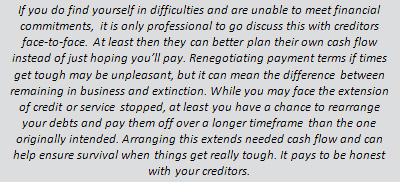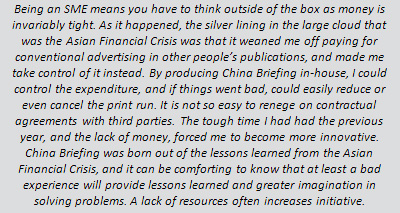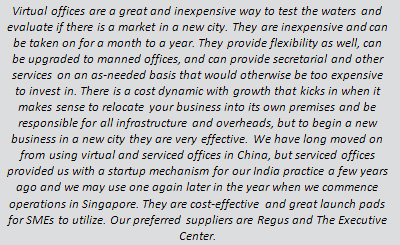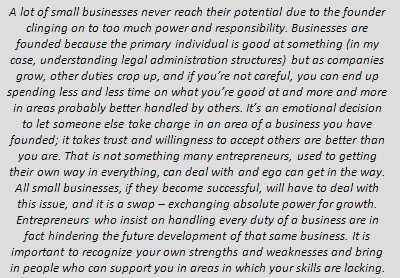SMEs in China and How to Manage One: Part III
Twenty early business lessons from a China entrepreneur
Lessons 11-15: From staff relations to giving up equity
This is part three of a four part series. To read part one please click here, part two is here, and part four is here.
Op-Ed Commentary: Chris Devonshire-Ellis
 Mar. 30 – As the Asian Financial Crisis deepened, business pipelines began to wither and die. While other Asian currencies devalued, the expectation was that China’s yuan would almost certainly do so as well. Certainly the economy was under severe pressure, and maintaining a strong yuan was making Chinese exports uncompetitive. As pressure continued on the Chinese to devalue, foreign investment into China dried up as accountants globally held off on China investment plans. I lost six months’ worth of income that just got shelved. I was now failing to pay my bills on time, and I had to tell my staff I needed to defer salaries by two weeks. Normal business creditors, themselves feeling the squeeze, were now also having to wait. People that owed me money were doing the same. It was, in effect, a cash flow crunch with no-one receiving money to pay anybody else. Yet staff needed to survive, and everyone needed to eat.
Mar. 30 – As the Asian Financial Crisis deepened, business pipelines began to wither and die. While other Asian currencies devalued, the expectation was that China’s yuan would almost certainly do so as well. Certainly the economy was under severe pressure, and maintaining a strong yuan was making Chinese exports uncompetitive. As pressure continued on the Chinese to devalue, foreign investment into China dried up as accountants globally held off on China investment plans. I lost six months’ worth of income that just got shelved. I was now failing to pay my bills on time, and I had to tell my staff I needed to defer salaries by two weeks. Normal business creditors, themselves feeling the squeeze, were now also having to wait. People that owed me money were doing the same. It was, in effect, a cash flow crunch with no-one receiving money to pay anybody else. Yet staff needed to survive, and everyone needed to eat.
To get away from the headaches, I attended the annual British Ball in Guangzhou. Parting the night away, I was able to forget the stresses of cash flow problems and the evening ended with a nice surprise – I won the first prize raffle – a pair of business class tickets from Hong Kong to Los Angeles. I hadn’t had a holiday for some time, and it had been years since I’d been to the States, while I’d never been to LA before.
Yet when looking at the finances, trying hard to justify the trip, the cost of hotels and other expenses would need to be squeezed out of an already stretched cash flow. To pay for the trip, I’d need to defer staff salaries a further two weeks. I was caught between really wanting and needing a break, having a golden opportunity to do so, and my responsibilities to my staff. It was quite a struggle, and my staff knew I had won this prize. However much I tried to justify the trip, my nagging doubts remained about my responsibilities. I eventually decided to give the tickets away to some friends. After I had done so, my most senior Chinese staff member, an accountant named Emily, asked to see me after work. She had joined the firm a few months previously following maternity leave, and had previously been with Ernst & Young. All the other staff looked up to her.
“Chris, all the staff know you won the ticket and really wanted to go to LA,” she said. “But we all appreciate that you didn’t and stayed to help the company through its troubles. If you had gone, I can tell you that no one would have been here by the time you got back. But I can see you’re sincere and we’ll work through the problems. Just leave the staff to me. Thank you for being a nice boss.”
Lesson 11 Cash flow meanwhile was still tight, and it was apparent that the newly found monthly accounting services income was all that was keeping the business afloat. All new business income and registrations had dried up. I had barely enough to sustain expenses, but repayment of the expensive advertising campaign I had embarked on was beyond me. Creditors in this field were calling me daily. I couldn’t keep stalling, and some were threatening legal action. Rather than keep putting them off, I decided the best thing to do would be to go and see them and explain exactly what the situation was. At least they’d then be able to plan without my income for a while, instead of hoping I’d pay the bills. It was painful, embarrassing, and not a little humiliating. Some were angry, but at least I had been honest. I rearranged the repayment terms, and only one (Hong Kong’s rather rapacious South China Morning Post) sued. All others were prepared to accept what little I could afford until things got better. They all knew that many businesses were in trouble. One experienced, British manager told me afterwards that he always knew I’d pay back the debt.
Cash flow meanwhile was still tight, and it was apparent that the newly found monthly accounting services income was all that was keeping the business afloat. All new business income and registrations had dried up. I had barely enough to sustain expenses, but repayment of the expensive advertising campaign I had embarked on was beyond me. Creditors in this field were calling me daily. I couldn’t keep stalling, and some were threatening legal action. Rather than keep putting them off, I decided the best thing to do would be to go and see them and explain exactly what the situation was. At least they’d then be able to plan without my income for a while, instead of hoping I’d pay the bills. It was painful, embarrassing, and not a little humiliating. Some were angry, but at least I had been honest. I rearranged the repayment terms, and only one (Hong Kong’s rather rapacious South China Morning Post) sued. All others were prepared to accept what little I could afford until things got better. They all knew that many businesses were in trouble. One experienced, British manager told me afterwards that he always knew I’d pay back the debt.
“When people come to see you to explain they can’t meet their bills, it means they’re sincere,” he said. “It’s the ones that try and avoid you that are the problems.”
Lesson 12 Things eventually began to get back to normal towards the end of the year, but it meant going into 1999 carrying debt. The advertising costs I had incurred as a result of my entering into annual contracts took a further 12 months to pay off, but I paid all in full. The legal process instigated by the SCMP took a while to kick in, and by the time it got to court I had enough to repay. But I have never taken advertising with them since. They were the largest business of all my creditors, and the least understanding to do business with when things got tough. So much for Rupert Murdoch’s newspaper empire.
Things eventually began to get back to normal towards the end of the year, but it meant going into 1999 carrying debt. The advertising costs I had incurred as a result of my entering into annual contracts took a further 12 months to pay off, but I paid all in full. The legal process instigated by the SCMP took a while to kick in, and by the time it got to court I had enough to repay. But I have never taken advertising with them since. They were the largest business of all my creditors, and the least understanding to do business with when things got tough. So much for Rupert Murdoch’s newspaper empire.
But now I had another problem – just as business was finally picking up and foreign investment arriving again, I had both little spare money and no inclination to spend any on advertising. Yet I needed to market my company. Expanding the previous success I had had with making photocopied brochures for my business, I hit upon the idea of making a monthly newsletter (there was no internet at the time). The first edition I titled “China Briefing” and wrote a three page article about setting up representative offices. The final, fourth page contained details of my office telephone contacts. I ran off 750 copies on a photocopier and distributed them around hotel business centers by hand, in both Shenzhen and Guangzhou. Within a few days, the phone was ringing with interested potential clients who had picked up a copy. The next month, I did the same thing, and ran off 1,000 copies of China Briefing about individual income tax filing. The same thing happened. I then went to Shanghai and Beijing, arranged virtual offices at Regus Business Centers to give me a local presence. The third issue I printed 10,000 copies, distributed in all four cities, and the calls kept coming…
Lesson 13 With calls coming in for business in Shanghai and Beijing, and with cash flow now a lot better, I could recruit. I employed two staff each in both cities, and Shenzhen was now up to 15 personnel. The virtual offices had done their jobs, and after just six months of operating in Beijing and Shanghai with a telephone messaging service, I now expanded these to fully manned offices with staff and set about applying for two more representative offices licenses for each. I now had a holding company in Hong Kong performing some administration work there, and three representative offices in China.
With calls coming in for business in Shanghai and Beijing, and with cash flow now a lot better, I could recruit. I employed two staff each in both cities, and Shenzhen was now up to 15 personnel. The virtual offices had done their jobs, and after just six months of operating in Beijing and Shanghai with a telephone messaging service, I now expanded these to fully manned offices with staff and set about applying for two more representative offices licenses for each. I now had a holding company in Hong Kong performing some administration work there, and three representative offices in China.
Lesson 14 I now had four offices: Hong Kong, Shenzhen, Shanghai and Beijing. But I was also struggling to manage the business. Paperwork is not my forte, and it was hard to manage accounts, keep track of cash flow, meet payroll on time, track receivables, meet clients, devise marketing plans and attend events. The previous summer I had engaged for a few months an Italian intern. He rejoined, although his MBA classmates were all working for MNCs on far higher salaries and initially thought he was nuts. But Alberto thought he’d learn more in a small business environment. As the business grew, recovered and then developed from the aftermath of the Asian Financial Crisis, I came to rely on him more and more.
I now had four offices: Hong Kong, Shenzhen, Shanghai and Beijing. But I was also struggling to manage the business. Paperwork is not my forte, and it was hard to manage accounts, keep track of cash flow, meet payroll on time, track receivables, meet clients, devise marketing plans and attend events. The previous summer I had engaged for a few months an Italian intern. He rejoined, although his MBA classmates were all working for MNCs on far higher salaries and initially thought he was nuts. But Alberto thought he’d learn more in a small business environment. As the business grew, recovered and then developed from the aftermath of the Asian Financial Crisis, I came to rely on him more and more.
Eventually time came to sit down and have a frank chat. We discussed the strong and weak points of each of us as individuals, and his strength was financial administration. Mine was more the legal and tax knowledge I’d accumulated and marketing skills. I recognized it would be nigh impossible to develop the business further without bringing someone dedicated into the company. I’d reached my maximum level of managing everything by the time the business had reached four offices, about 20 staff and an annual turnover of around a million U.S. dollars. In order to grow, I had to both devolve power and share responsibilities. I gave Alberto equity in the firm and he became a director and a business partner. We divided up responsibilities between us, and it meant I had more time to develop the business, while our administration would also improve. It had taken seven years to reach a turnover of a million U.S. dollars. Getting it up to two million, with better management systems, administration and improved focus and direction, would take just another 12 months. Giving up equity in order to grow and keep employees who would otherwise have left was an emotional decision as founder of the business, but proved to be utterly justified as a pragmatic one.
Lesson 15 This is part three of an original four part series on managing and operating a SME in China from scratch. To read part one please click here, part two is here, and part four is here.
This is part three of an original four part series on managing and operating a SME in China from scratch. To read part one please click here, part two is here, and part four is here.
Chris Devonshire-Ellis is the founding partner and principal of Dezan Shira & Associates, a foreign direct investment practice offering legal establishment, tax, accounting and due diligence services throughout China. Established in 1992, the firm now has ten China offices, five in India and two in Vietnam.
 Chris’ popular book “The Story of a China Practice” details his early years of setting up in China and is a must read for all entrepreneurs interested in the country. It sold out its initial print run of 10,000 copies but is now available as a complimentary download from our Asia Briefing Bookstore here.
Chris’ popular book “The Story of a China Practice” details his early years of setting up in China and is a must read for all entrepreneurs interested in the country. It sold out its initial print run of 10,000 copies but is now available as a complimentary download from our Asia Briefing Bookstore here.
- Previous Article China-India Business Update: Mar. 29
- Next Article New Issue of China Briefing: Financial Management








































